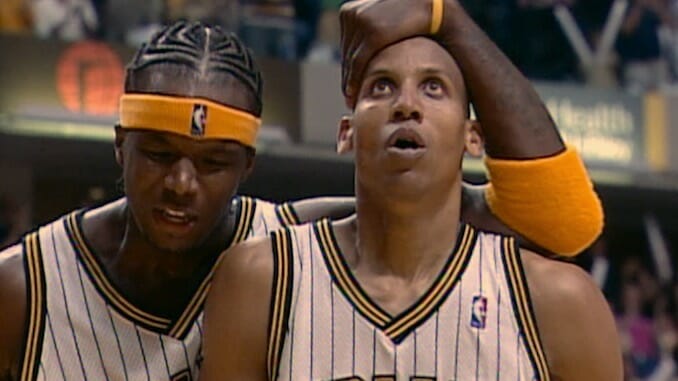Untold, Netflix’s New Sports Docuseries, Gets a Stellar Start with “Malice at the Palace”
Photo Courtesy of Netflix
If you’re a sports fan, and particularly if you’re a fan of basketball and the NBA, I encourage you to do what I did a few months ago, independent of this essay, and go watch unedited footage of the so-called “Malice at the Palace.” Even if you lived through it, even if you think you remember it, I can guarantee you that you’ll be astounded by the ferocity of the whole spectacle, from the point when Ron Artest races into the stands to fight the (wrong) fan, to Jermaine O’Neal’s haymaker that somehow managed not to kill another fan, to the full-on assault as the Indiana Pacers left the floor of the Palace of Auburn Hills, getting bombarded by everything from popcorn to water to bottles to an actual chair. We’re less than 20 years removed from it, but I guarantee you that it has been diminished in your memory from its original, unbelievable intensity.
All of which is to say that it’s an excellent subject for a sports documentary, and one which ESPN’s series 30 for 30 somehow hasn’t covered. Stepping into that vacuum is Untold, the new five-part Netflix sports documentary series with episodes planned on everything from Caitlyn Jenner to Mardy Fish. There are three basic metrics by which sports documentaries should be judged, and they are:
1. The strength of storytelling (is it riveting, is it fun?)
2. The thoroughness (is it a comprehensive work of journalism, with attempts to at least consider all sides and along with the broader societal elements?)
3. The ability to convince you that this is something important.
As a recent example, ESPN’s Michael Jordan documentary The Last Dance was a smash hit on the first and third metric, but made almost no effort at anything like objectivity, which limits its artistry despite its massive popular success.
Malice at the Palace succeeds on all three fronts, and it does so in the tidy span of an hour that you’ll wish was longer. Director Floyd Russ makes the wise choice to focus most of his attention on the three Indiana Pacers who were suspended for fighting—Ron Artest (now Metta World Peace), Jermaine O’Neal, and Stephen Jackson—and one, the superstar Reggie Miller, who was not. Set in dim, low light, they are the narrative engine; but the brilliance of this documentary is that it’s not limited to their perspective. With tons of footage from the melee itself, interviews with police, prosecutors, announcers, Pistons star Ben Wallace, Pacers general manager Donnie Walsh, and even one of the fans who tried to fight Artest, it’s an incredibly efficient work of drama, made more so by the fact that it’s clear there were interviews he couldn’t land, from the late David Stern to Rick Carlisle to Larry Bird.
In short, the story is that the Pacers and Pistons were two of the best teams in the NBA, their long-time rivalry had reached a fever pitch in the fall of 2004, a season after the Pistons won the NBA title after beating the Pacers in the conference finals, and both teams appeared poised to compete for a title. When the Pacers came into Detroit on Nov. 19, 2004, and proceeded to beat up on the defending champions, they were understandably ecstatic. Ron Artest, who struggled with emotional issues, provoked a fight with Ben Wallace, and in the aftermath of their shoving match—the kind you see routinely in the NBA, and that rarely escalates to fisticuffs—he was hit by a fan with a beer bottle, raced into the stands, and provoked utter chaos. Eventually, he, O’Neal, and Jackson were hit with long suspensions, and Artest’s lasted for the remainder of the season.
-

-

-

-

-

-

-

-

-

-

-

-

-

-

-

-

-

-

-

-

-

-

-

-

-

-

-

-

-

-

-

-

-

-

-

-

-

-

-

-








































